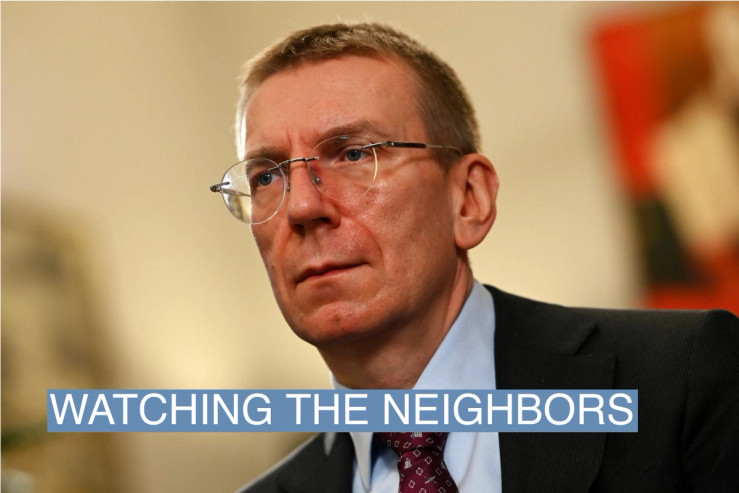The News
The president-elect of Latvia, Edgars Rinkēvičs, worries that the arrival of Wagner mercenary force head Yevgeny Prigozhin and his troops in neighboring Belarus poses risks for both countries, he told Semafor in an interview.
“We already have a very tense situation on the Latvian-Belarusian border with migration being used as a hybrid weapon,” he said, referring to Belarus’s practice of pushing refugees from countries to its East across its western borders. “If all of a sudden the mercenaries want to pretend to be refugees or migrants, then of course, it creates a whole new security threat.”
(After the interview was conducted, reports emerged that Prigozhin had apparently returned to Russia in order to collect personal guns and money.)
Rinkēvičs said he had no direct evidence that the mercenaries would seek asylum. “We believe that we need to analyze all kinds of assumptions, including the one that this group can be used just to test the resilience of neighboring countries, test the resilience of NATO.”
But Rinkēvičs said the most immediate threat might be to Belarus itself, where he noted that the police arrested more than 30 Wagner fighters before the disputed 2020 election, accusing them of planning election interference.
“I am a bit surprised that Mr. Lukashenko has allowed some number of well-trained mercenaries, with the head of that company who has proved that he is a bit rogue,” he said. “If Mr Putin is not able to control him fully, then why does Mr. Lukashenko believe that he is able to control him?”
Rinkēvičs, who served as Latvia’s foreign minister since 2011, will be inaugurated as the country’s president Saturday. He spoke to Semafor Wednesday in a conference room in his country’s foreign ministry in Riga in front of display cases holding diplomatic documents from Latvia’s first period of independence before World War II.
His role, and the country’s policy, is focused largely on strengthening the country’s NATO-backed security in the wake of Russia’s invasion of Ukraine. Rinkevics warned against underestimating the Russian military.
“We keep in mind that not all Russian military units, especially the Air Force, have been fully deployed in Ukraine,” he said. “There is substantial capability in the Russian military that we need to take seriously.”
“That’s why we are working with NATO allies also to strengthen the presence of NATO troops here in, in the Baltic States, in Poland in the so-called ‘Eastern flank,’” he said.
Know More
When we spoke, the tall, bespectacled, and understated Rinkēvičs had just returned from a walk around the city, which is packed for Latvia’s quinquennial song and dance festival. He’d taken scores of selfies, he said, and noted that nobody had even asked about the thing that made global headlines when he was inaugurated: He’ll be the world’s first openly gay president.
“After the first of couple of days, some people on social media got over excited in a positive way and some over-excited in a negative way and it has calmed down here completely,” he said. “Nobody cares anymore about that.”
His election by parliament with the support of some conservative MPs was an indication that “the country is changing on its own pace,” he said. “It takes time, and let’s not forget that we still are managing a lot of ghosts the Soviet past.
“So, but believe me, the positive or the negative attitude towards my presidency is going to be defined by completely different things, not being gay,” he said.
I also asked Rinkēvičs about the widely-shared 2014 tweet in which he came out as gay.
To whom, I asked, was he wishing good luck?
“I didn’t know what the reaction would be, so that was probably more addressed to myself than to the whole world,” he said. “But look, I got a huge support from Prime Minister of the time, the speaker of the parliament.
“And as I said, in about three or four months, nobody cares, nobody cares.”
Notable
- Rinkevics has been pressing for sanctions on Belarus since last year. “We must not forget about the co-responsibility of the Belarusian regime in Russia’s war in Ukraine,” he said in July.
- Eastern European countries have embraced minority rights in part in an effort to distance themselves from Russian influence, writes Michael Birnbaum for The Washington Post. Although right-wing figures prevail in many of these countries, the general acceptance of gay rights has coincided with many of these countries joining the European Union and embracing EU political values.


